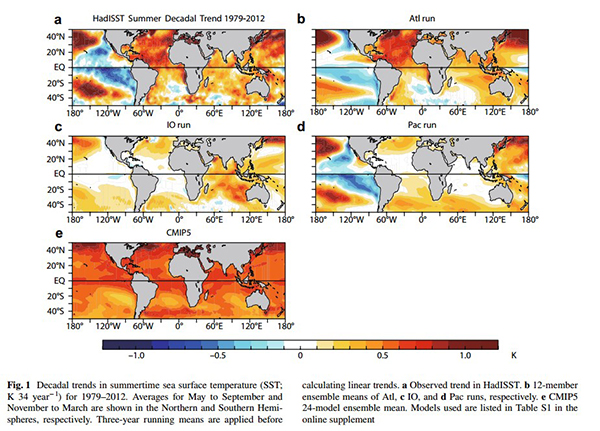最新科研进展
Atlantic effects on recent decadal trends in global monsoon
Authors:
Youichi Kamae1,2 Xichen Li2,3 ·Shang?Ping Xie2 ·Hiroaki Ueda1
1 Faculty of Life and Environmental Sciences, University of Tsukuba, 1-1-1 Tennoudai, Tsukuba, Ibaraki 305-8506, Japan 2 Scripps Institution of Oceanography, University of California San Diego, La Jolla, CA, USA 3 Institute of Atmospheric Physics, Chinese Academy of Sciences, Beijing, China
Abstract:
Natural climate variability contributes to recent decadal climate trends. Specifically the trends during the satellite era since 1979 include Atlantic and Indian Ocean warming and Pacific cooling associated with phase shifts of the Atlantic Multidecadal Oscillation and the Pacific Decadal Oscillation, and enhanced global monsoon (GM) circulation and rainfall especially in the Northern Hemisphere. Here we evaluate effects of the oceanic changes on the global and regional monsoon trends by partial ocean temperature restoring experiments in a coupled atmosphere–ocean general circulation model. Via trans-basin atmosphere–ocean teleconnections, the Atlantic warming drives a global pattern of sea surface temperature change that resembles observations, giving rise to the enhanced GM. The tropical Atlantic warming and the resultant Indian Ocean warming favor subtropical deep-tropospheric warming in both hemispheres, resulting in the enhanced monsoon circulations and precipitation over North America, South America and North Africa. The extratropical North Atlantic warming makes an additional contribution to the monsoon enhancement via Eurasian continent warming and resultant land–sea thermal gradient over Asia. The results of this study suggest that the Atlantic multidecadal variability can explain a substantial part of global climate variability including the recent decadal trends of GM.
Keywords:
Global monsoon · PDO · AMO · Meridional thermal gradient

Citation:
Kamae, Youichi, Xichen Li, Shang-Ping Xie, and Hiroaki Ueda. "Atlantic effects on recent decadal trends in global monsoon." Climate Dynamics (2017): 1-13.
